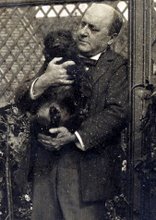Thursday, August 2, 2007
Boss Tweed
The presidential system has turned out badly, for a couple of reasons. Two recent books by Kenneth D. Ackerman (both are entertaining in lots of ways) illustrate them. In "Dark Horse," he talked about party politics in the amazingly corrupt era after the Civil War, when Republicans controlled all three branches of the federal government, and fell to fighting over the spoils. In his latest, "Boss Tweed," he talks about Tweed's audacious effort to seize control first of the Democratic Party in New York City, and then to extend his control first to the state and then to the national government. He was thwarted by a venomous rival, Samuel Tilden, who used the governor's powers to bring down Tammany Hall. Ackerman makes it a curiously modern story of political power, media power, and the use of criminal prosecutions for political ends. Some lessons drawn in the final chapter have a familiar ring: "It's hard not to admire the skill behind Tweed's system. . . . The Tweed Ring at its height was an engineering marvel, strong and solid, strategically placed to control key power points: the courts, the legislature, the treasury, and the ballot box." The system was financed by contracts awarded to the friends of Tammany Hall, and the contracts were financed by borrowing. "Tweed's system had an irresistible logic . . . Taxes stayed low; [the Ring] financed city operations mostly with debt, selling bonds [abroad] . . . pushing off payment until another day. For the wealthy, Tweed produced dynamism and growth." His regime produced a surge of civic pride, a kind local nationalism. Unfortunately, the pyramid of debt eventually collapsed, as it was bound to do. Moral of the story, perhaps: Party rule leads to problems, whatever the party.
Subscribe to:
Post Comments (Atom)


No comments:
Post a Comment